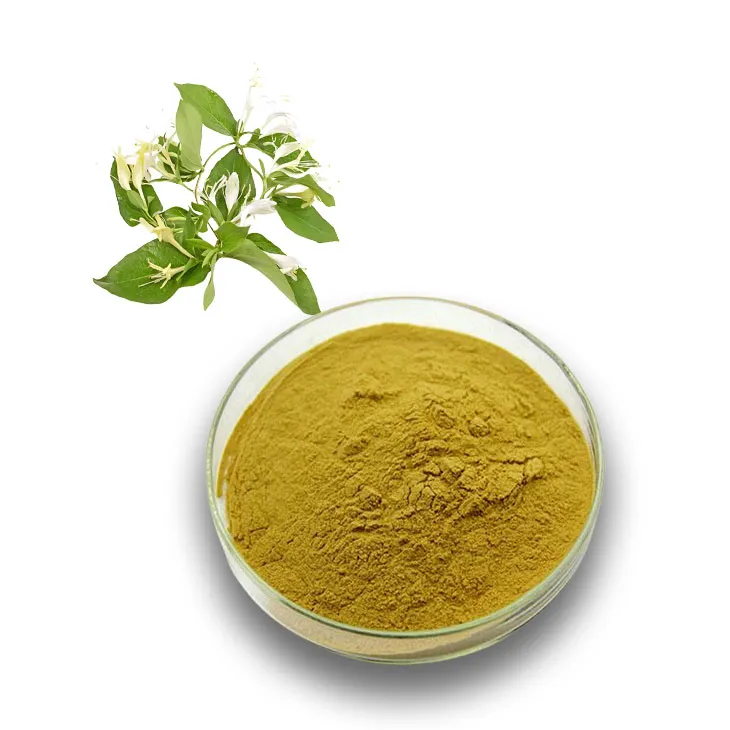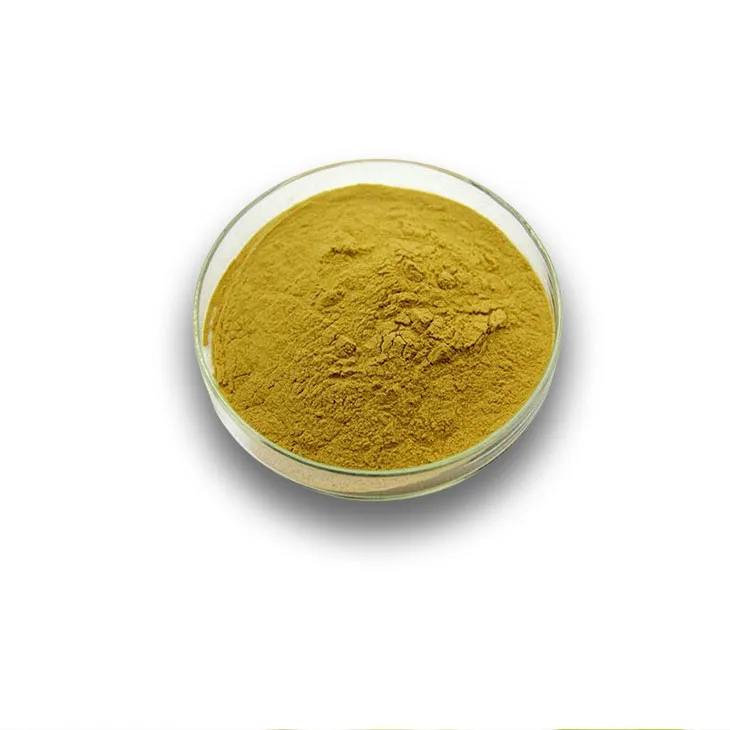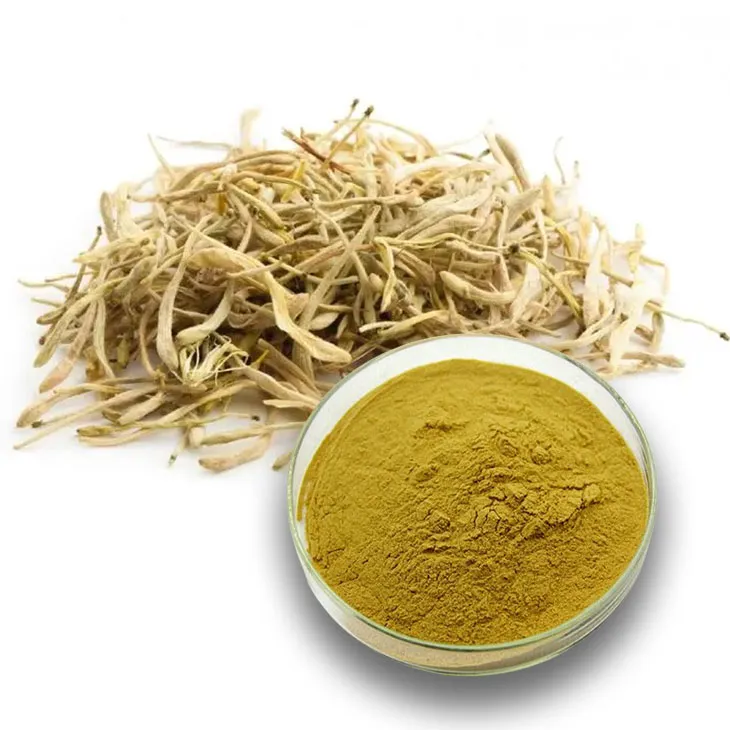- 0086-571-85302990
- sales@greenskybio.com
How do top honeysuckle pollen manufacturers take advantage of new projects?
2024-12-18

1. Introduction
In the highly competitive market of Honeysuckle Pollen products, top manufacturers are constantly seeking ways to stand out and gain an edge. New projects present excellent opportunities for these manufacturers to innovate, expand their customer base, and enhance their brand image. This article will explore how top Honeysuckle Pollen manufacturers can take advantage of new projects in various aspects.

2. Product Innovation
2.1 New Formulations
One of the most important ways for top Honeysuckle Pollen manufacturers to utilize new projects is through product innovation. Developing new formulations of honeysuckle pollen products can attract more consumers. For example, they can combine honeysuckle pollen with other natural ingredients such as herbs or fruits. This combination can not only enhance the taste but also may have synergistic health effects.
By researching and developing new formulations, manufacturers can target different consumer needs. For instance, a formulation combined with lavender might be designed for consumers who are looking for relaxation and stress relief, while a combination with citrus fruits could be aimed at those who prefer a refreshing and energizing product.
2.2 Functional Enhancements
In new projects, manufacturers can also focus on enhancing the functionality of honeysuckle pollen products. This could involve improving the bioavailability of the pollen's nutrients. Through advanced extraction and processing techniques, they can make the beneficial components in the pollen more easily absorbed by the body.
Another aspect of functional enhancement is customizing products for specific health conditions. For example, creating a honeysuckle pollen product that is rich in antioxidants for consumers who are concerned about anti - aging, or a product with anti - inflammatory properties for those with joint problems.

3. Customer Service
3.1 Professional Product Usage Advice
Providing excellent customer service in new projects is crucial for top honeysuckle pollen manufacturers. Offering professional advice on product usage is one of the key elements. Since honeysuckle pollen products may have different consumption methods and precautions, it is important to educate customers.
Manufacturers can provide detailed instructions on how to take the product, such as the best time of day, whether it should be taken with or without food, and the appropriate dosage. For example, if a honeysuckle pollen supplement is designed to boost the immune system, the manufacturer can advise customers to take it regularly during the cold and flu season and how to adjust the dosage based on individual health conditions.
3.2 Personalized Health Solutions
Another aspect of customer service in new projects is offering personalized health solutions. With the increasing demand for personalized health care, manufacturers can collect customer information such as age, gender, health concerns, and lifestyle habits.
Based on this information, they can then recommend the most suitable honeysuckle pollen products or combinations of products. For example, for a young female customer who is concerned about skin health, the manufacturer could recommend a product that contains additional skin - nourishing ingredients along with honeysuckle pollen.
By providing personalized health solutions, manufacturers can build stronger relationships with their customers and increase customer loyalty. Customers will feel that the manufacturer truly cares about their well - being and is not just selling a product.

4. Environmental Protection and Sustainability
4.1 Sustainable Production Methods
In today's environmentally - conscious world, top honeysuckle pollen manufacturers should consider environmental protection and sustainability in their new projects. Adopting sustainable production methods is a great way to achieve this.
For example, they can use renewable energy sources in the production process. This could include installing solar panels to power the manufacturing facilities or using wind - generated electricity. By reducing reliance on non - renewable energy sources, manufacturers can lower their carbon footprint.
Another aspect of sustainable production is reducing waste. Manufacturers can implement waste - reduction strategies such as recycling packaging materials, minimizing water usage in production, and optimizing the production process to reduce raw material waste.
4.2 Eco - friendly Packaging
Eco - friendly packaging is also an important part of environmental protection in new projects. Instead of using traditional plastic packaging, manufacturers can choose biodegradable or recyclable materials.
For example, they can use paper - based packaging that is coated with a natural, non - toxic substance to protect the product. This not only reduces the environmental impact but also appeals to consumers who are more likely to choose products with sustainable packaging.
4.3 Promoting Sustainable Cultivation
Manufacturers can also play a role in promoting the sustainable cultivation of honeysuckle. They can work with farmers to ensure that the cultivation process is environmentally friendly.
This could involve using organic fertilizers and pesticides, conserving water during cultivation, and protecting the natural habitats of pollinators. By promoting sustainable cultivation, manufacturers can ensure a stable supply of high - quality honeysuckle pollen while also contributing to environmental conservation.

5. Marketing and Brand Building
5.1 Targeted Marketing Campaigns
In new projects, top honeysuckle pollen manufacturers should carry out targeted marketing campaigns. They need to identify their target market segments based on factors such as age, gender, location, and consumer behavior.
For example, if the product is aimed at young, health - conscious consumers in urban areas, the marketing campaign could focus on digital platforms such as social media and fitness apps. The messaging could emphasize the modern and convenient aspects of the product, such as easy - to - use packaging and its compatibility with an active lifestyle.
On the other hand, if the target market is older consumers who are more interested in traditional health remedies, the marketing could be more focused on print media and word - of - mouth referrals. The messaging could highlight the long - standing use of honeysuckle in traditional medicine and the product's authenticity.
5.2 Brand Storytelling
Brand storytelling is another effective marketing strategy in new projects. Manufacturers can tell the story of their brand, including its history, values, and the origin of their honeysuckle pollen products.
For example, they can share how they source their honeysuckle from small - scale, family - owned farms that have been cultivating honeysuckle for generations. This story can create an emotional connection with consumers and differentiate the brand from competitors.
By building a strong brand story, manufacturers can increase brand awareness and loyalty. Consumers are more likely to choose a product from a brand that they can relate to on an emotional level.
6. Collaboration and Partnerships
6.1 Industry Collaborations
Top honeysuckle pollen manufacturers can take advantage of new projects through industry collaborations. Collaborating with other companies in the same industry, such as other herbal product manufacturers or supplement companies, can bring many benefits.
For example, they can jointly develop new products or share research and development resources. This can speed up the innovation process and reduce costs. They can also collaborate on marketing initiatives, such as co - sponsoring health events or sharing advertising space.
6.2 Partnerships with Research Institutions
Partnerships with research institutions are also valuable in new projects. Research institutions can provide scientific support for product development and quality control.
Manufacturers can work with research institutions to conduct studies on the health benefits of honeysuckle pollen, its safety, and the optimal dosage. This scientific evidence can be used in marketing and to gain the trust of consumers.
Moreover, research institutions can help manufacturers stay updated on the latest scientific research and technological advancements in the field, enabling them to continuously improve their products and production processes.
7. Conclusion
Top honeysuckle pollen manufacturers have many opportunities to take advantage of new projects. Through product innovation, excellent customer service, environmental protection and sustainability, marketing and brand building, and collaboration and partnerships, they can enhance their competitiveness in the market, attract more customers, and contribute to the long - term development of the industry. In the future, as consumer demands and market trends continue to evolve, manufacturers need to stay flexible and innovative in their approach to new projects to remain at the top of the industry.
FAQ:
Q1: How can top honeysuckle pollen manufacturers ensure product innovation in new projects?
Top manufacturers can ensure product innovation in new projects by researching and developing new formulations. For example, they can combine honeysuckle pollen with other natural ingredients. This might involve experimenting in the laboratory to find combinations that offer enhanced health benefits or unique sensory experiences. They can also invest in research to understand the chemical and biological properties of honeysuckle pollen better, which can lead to new product ideas. Another way is to keep an eye on emerging trends in the health and wellness market and adapt their products accordingly.
Q2: Why is customer service important for top honeysuckle pollen manufacturers in new projects?
Customer service is crucial for top honeysuckle pollen manufacturers in new projects because it helps build customer loyalty. When manufacturers offer excellent customer service, such as providing professional advice on product usage, customers feel more confident in using the products. Personalized health solutions are also part of good customer service. This shows that the manufacturer cares about the individual needs of the customers. Satisfied customers are more likely to repurchase the products and recommend them to others, which is beneficial for the long - term success of the new projects.
Q3: What are the sustainable production methods that top honeysuckle pollen manufacturers can adopt in new projects?
Manufacturers can adopt several sustainable production methods in new projects. One is to use eco - friendly packaging. This can include using biodegradable materials or recyclable containers. Another method is to promote the sustainable cultivation of honeysuckle. They can work with farmers to ensure that the cultivation practices are environmentally friendly, such as using natural fertilizers and reducing water waste. Additionally, they can look into energy - efficient production processes in their manufacturing facilities to reduce their carbon footprint.
Q4: How can top honeysuckle pollen manufacturers attract environmentally - conscious consumers in new projects?
To attract environmentally - conscious consumers in new projects, manufacturers can focus on environmental protection and sustainability. As mentioned before, using eco - friendly packaging is a visible way to show their commitment. Promoting the sustainable cultivation of honeysuckle can also be appealing. They can communicate these efforts clearly on their product labels and marketing materials. Additionally, participating in environmental initiatives or getting relevant certifications can increase their credibility among these consumers.
Q5: What challenges might top honeysuckle pollen manufacturers face when implementing new projects?
Manufacturers might face several challenges when implementing new projects. One challenge could be regulatory compliance. There may be specific regulations regarding the production, labeling, and marketing of honeysuckle pollen products that they need to adhere to. Another challenge could be cost. Developing new formulations, adopting sustainable production methods, and providing excellent customer service may all incur additional costs. There could also be challenges related to market acceptance. Consumers may be resistant to new product formulations or concepts, and it may take time and effort to educate them.
Related literature
- Innovations in Honeysuckle Pollen Production"
- "Sustainable Practices in the Honeysuckle Pollen Industry"
- "Customer Service and Product Success in the Honeysuckle Pollen Market"
- ▶ Hesperidin
- ▶ citrus bioflavonoids
- ▶ plant extract
- ▶ lycopene
- ▶ Diosmin
- ▶ Grape seed extract
- ▶ Sea buckthorn Juice Powder
- ▶ Beetroot powder
- ▶ Hops Extract
- ▶ Artichoke Extract
- ▶ Reishi mushroom extract
- ▶ Astaxanthin
- ▶ Green Tea Extract
- ▶ Curcumin Extract
- ▶ Horse Chestnut Extract
- ▶ Other Problems
- ▶ Boswellia Serrata Extract
- ▶ Resveratrol Extract
- ▶ Marigold Extract
- ▶ Grape Leaf Extract
- ▶ blog3
- ▶ blog4
- ▶ blog5
-
Pure 85% Tomentil Extract.
2024-12-18
-
White Willow Bark Extract
2024-12-18
-
Cat Claw Extract
2024-12-18
-
Sophora Japonica Flower Extract
2024-12-18
-
Rosemary extract
2024-12-18
-
Saffron Extract Powder
2024-12-18
-
Cocoa Extract
2024-12-18
-
Calendula Extract
2024-12-18
-
Grapefruit Seed Extract Powder
2024-12-18
-
Mangosteen extract powder
2024-12-18
-
Rose Hip Extract
2024-12-18





















